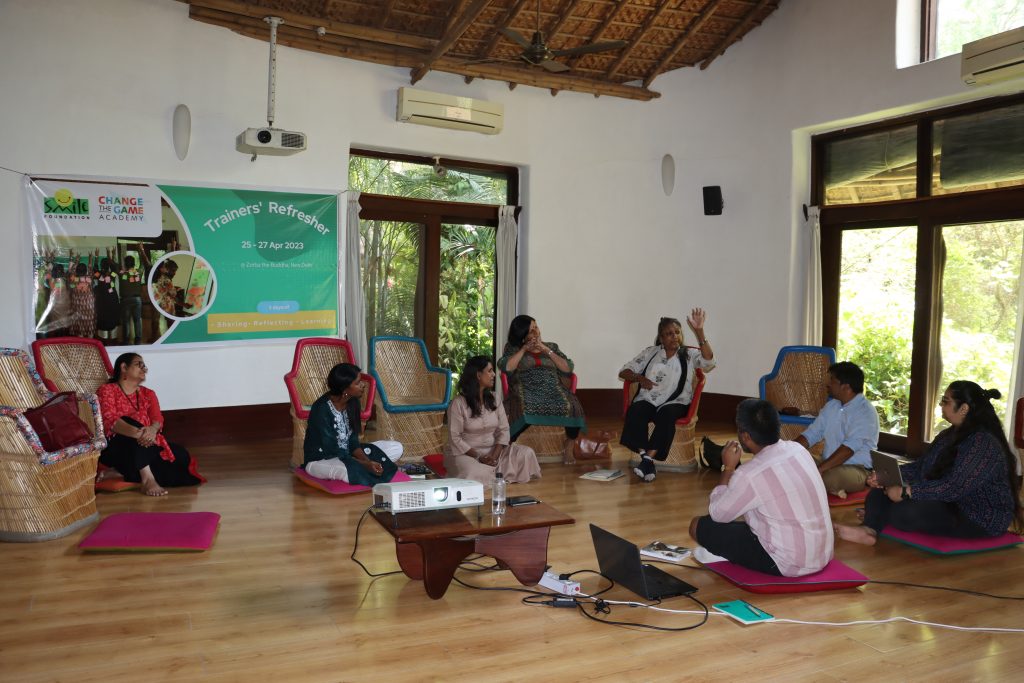India, with its vast and diverse population, holds immense potential for development and progress. One of the key drivers of sustainable change lies in empowering the grassroots— the local communities and individuals who are at the forefront of social, economic, and environmental challenges.
Grassroots social initiatives in India are community-based approaches created to address localized problems. These initiatives are primarily made up of civilians advocating a cause to spur change at local, national, or international levels. Grassroots initiatives are considered a bottom-up approach that brings similarly placed communities together to advocate for their rights.
These initiatives can quickly gain momentum on the local level because they are generally enacted by local actors. Moreover, larger organizations could benefit from local grassroots initiatives that are directly connected to the issues and the people living in need. In India, grassroots initiatives are indispensable for promoting sustainable development. Most of the development challenges have local dimensions in developing countries like India, and local institutions can be instrumental in stimulating economic growth, promoting socio-political development, and protecting the environment for achieving sustainable development at the bottom level of society.
Let’s understand the significance of empowering grassroots in India and explores how it can bring about positive transformations at the grassroots level.
Local Knowledge and Contextual Solutions
Grassroots communities possess invaluable local knowledge and insights into the challenges they face. Empowering them enables the identification of context-specific solutions that address the unique needs and complexities of their environment. Local communities understand the social dynamics, cultural nuances, and environmental factors, making them better equipped to devise sustainable and effective solutions.
Participatory Development and Ownership
The empowerment of grassroots initiatives ensures their active participation in the decision-making process, fostering a sense of ownership and responsibility. Involving local communities in the planning, implementation, and monitoring of development initiatives leads to more inclusive and sustainable outcomes. When individuals have a say in the development of their communities, they become active agents of change and work towards long-term solutions.
Strengthening Social Cohesion and Community Bonds
Social initiatives at the grassroots level foster social cohesion and strengthen community bonds. By encouraging collaboration, mutual support, and collective action, grassroots empowerment nurtures a sense of belonging and unity among community members. This creates a strong foundation for tackling social issues, promoting inclusivity, and fostering social harmony.
Sustainable Economic Growth and Livelihoods
Empowering grassroots communities contributes to sustainable economic growth by harnessing local resources and entrepreneurial potential. Initiatives that focus on skill development, entrepreneurship, and access to markets enable individuals to create livelihood opportunities. This not only improves their economic well-being but also leads to community-level prosperity and reduced dependency on external aid.
Environmental Stewardship and Sustainability
Grassroots communities play a vital role in environmental stewardship and sustainability. By promoting awareness, education, and engagement, grassroots initiatives drive local conservation efforts, sustainable resource management, and climate resilience. Local communities are often the custodians of natural resources, and their empowerment ensures responsible and sustainable practices for a greener and healthier future.
Bottom-Up Policy Influence and Advocacy
Empowered grassroots communities possess the potential to influence policies and advocate for their rights and needs. By amplifying their voices, they can drive meaningful policy changes, address systemic inequalities, and advocate for social justice. Grassroots empowerment encourages citizen participation in governance processes, ensuring policies are responsive to the needs of the most marginalized and vulnerable sections of society.
Driving Local Innovation and Creativity
Grassroots social initiatives often operate in resource-constrained environments, necessitating innovative and creative solutions. Empowering these initiatives unlocks local talent, creativity, and ingenuity. By providing the necessary support, resources, and platforms, these initiatives can nurture and amplify innovative ideas that address social challenges in unique ways.
Promoting Inclusivity and Social Justice
Grassroots social initiatives play a vital role in promoting inclusivity and social justice. They tirelessly uplift marginalized communities, empower vulnerable groups, and advocate for their rights. Through targeted interventions and advocacy efforts, these initiatives address systemic inequalities and strive for a more equitable society.
Amplifying the Voice of the Marginalized
Grassroots social initiatives provide a platform for the marginalized and unheard to voice their concerns, aspirations, and perspectives. Empowering these initiatives amplifies the voices of those who have long been marginalized, ensuring their stories are heard and their issues are addressed. This leads to greater social inclusion, representation, and a more democratic society.
Smile Foundation and Empowering Grassroots
At Smile Foundation, the Empowering Grassroots programme is built on the belief that harnessing the potential of social change makers and grassroots initiatives is crucial to addressing the needs of civil society in line with global development strategies. This program aims to cultivate self-reliance, sustainability, and credibility within social entrepreneurs and initiatives, thereby creating a significant social impact through a multiplier effect.
The primary objective of the programme is to empower social entrepreneurs and initiatives to become self-sustainable by utilizing the available resources within the country. By doing so, these initiatives can generate meaningful social impact and contribute to the larger development goals.
To achieve this objective, the programme follows a capacity-building trajectory that focuses on enhancing the credibility, legitimacy, accountability, and service orientation of grassroots initiatives. This trajectory entails a combination of training, coaching, mentoring, and handholding activities. By investing in capacity building, these initiatives can establish strong relationships with stakeholders, garner support from civil society, and work collaboratively with the government to drive local social development.
The Empowering Grassroots programme recognizes the power of collaboration and peer learning. It strives to create a community of change-makers who can learn from each other’s experiences and contribute to one another’s success. Through peer learning networks and communities of practice, social entrepreneurs can share knowledge, exchange best practices, and collectively tackle challenges that arise in their respective initiatives.
By participating in the Empowering Grassroots programme, social change-makers and grassroots initiatives gain access to the necessary tools, resources, and guidance to strengthen their operations and expand their reach. The capacity building provided through the program enables them to build credibility, enhance their service delivery, and establish stronger connections with stakeholders. Ultimately, these empowered initiatives can make a significant difference in their communities and contribute to the broader social development agenda.
Conclusion
Empowering grassroots social initiatives in India is of paramount importance as they bring about transformative change from the ground up. By recognizing and supporting these initiatives, we foster community-driven solutions, promote inclusivity, and create a more just and equitable society.
Through participatory approaches, social cohesion, and economic empowerment, grassroots initiatives pave the way for transformative change at the grassroots level. As we empower individuals and communities from the ground up, we build a stronger, more equitable, and prosperous India for all.









